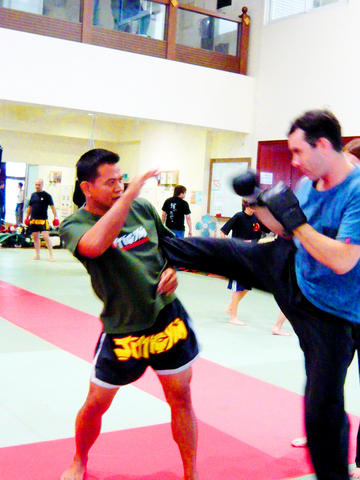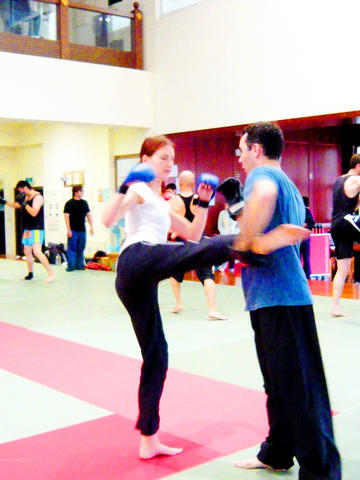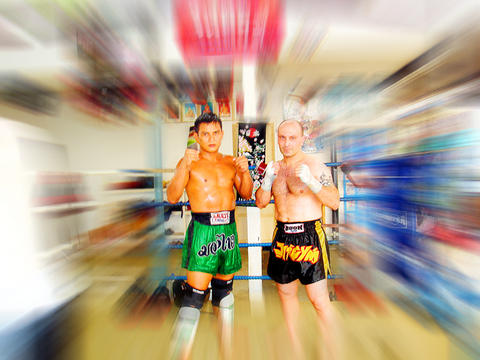This weekend, the Fares Academy, a dojo run by osteopath Antoine Fares, will host a seminar featuring two Muay Thai, or Thai boxing, champions, who will provide an introduction to the sport and instruction in its techniques.
"In setting up this seminar, I want to bring local people into Thai boxing ... lots of people have an apprehension of Thai boxing because of its image as violent and having brutal training," Fares said. "But, actually, if you look in the West now, it is a very trendy ... . Many women are practicing kick and Thai boxing for cardio health and fitness."
Fares, who himself was three-times Belgium Muay Thai and Kick Boxing Champion in the early 1990s, and earned other competitive fighting titles, said he found it difficult to link up with Muay Thai practitioners and other martial arts practitioners in Taiwan, suggesting that an unwillingness by local martial arts masters to go head-to-head kept the wider marital arts community fragmented.

PHOTO: COURTESY OF ANTOINE FARES
"Lots of people are a little bit afraid to show their level, their skill. They do not want to fight in front of their students, or in front of other teachers. They don't want to open up," Fares said.
Fares is a strong proponent of mixed martial arts (MMA). "If people [in different disciplines] can work together under an MMA umbrella ... it doesn't matter what the other guy is doing as long as he accepts that we do something more than what he normally does," he said.
MMA has achieved a high degree of international attention particularly through the pay-per-view broadcasting of the US Ultimate Fighting Championship and PRIDE Fighting Championship, which have developed broad rules to accommodate a wide range of fighting techniques while disallowing vicious moves such as gouging and savaging a downed opponent. The kickboxing and clinch techniques used in Muay Thai are held in high regard within the MMA community, Fares said.

PHOTO: COURTESY OF ANTOINE FARES
By inviting recognized champions from Thailand, Fares hopes to rise above local differences over technique and style. "These guys can set the
standard," he said. "If we take Thai boxing as a model, then who is better than a professional Thai boxer to come and show [how it is done]."
The idea of hybrid styles of boxing is not new to Taiwan, and competitions in what is called sanda (散打) have an established presence. Sanda is a mixed style of fighting that has developed out of Chinese martial arts and is one of two disciplines recognized by the International Wushu Federation. Fares says he is trying to generate interest from the sanda community and other martial artists, because "Thai boxing is a very beautiful art and it doesn't matter if you are doing sanda or anything else, you can always pick up things and add it to what you do."

PHOTO: COURTESY OF ANTOINE FARES
The Fares Academy Muay Thai Seminar will feature Serm Damriram and Krittaya "Berm" Makate, both of whom have over 100 professional fights under their belts. The seminar will deal with boxing and kicking, use of elbows and knees, clinch work, stance and balance, pad work, conditioning and stamina training. Fares emphasized that the seminar is as much about physical fitness as fighting technique and everyone over eight years of age is welcome to attend.
The seminar runs tomorrow and Sunday from 3pm to 5:30pm at 228 Xinhu 2nd Rd, Neihu Dist, Taipei City (台北市內湖區新湖二路228號1樓) and costs NT$1,000. To ensure that equipment is available for all participants, contact Antoine Fares at 0922-131-649 to confirm your participation. Organic coffee and alcohol-free beer will be provided as refreshments.

Behind a car repair business on a nondescript Thai street are the cherished pets of a rising TikTok animal influencer: two lions and a 200-kilogram lion-tiger hybrid called “Big George.” Lion ownership is legal in Thailand, and Tharnuwarht Plengkemratch is an enthusiastic advocate, posting updates on his feline companions to nearly three million followers. “They’re playful and affectionate, just like dogs or cats,” he said from inside their cage complex at his home in the northern city of Chiang Mai. Thailand’s captive lion population has exploded in recent years, with nearly 500 registered in zoos, breeding farms, petting cafes and homes. Experts warn the

No one saw it coming. Everyone — including the Chinese Nationalist Party (KMT) — expected at least some of the recall campaigns against 24 of its lawmakers and Hsinchu Mayor Ann Kao (高虹安) to succeed. Underground gamblers reportedly expected between five and eight lawmakers to lose their jobs. All of this analysis made sense, but contained a fatal flaw. The record of the recall campaigns, the collapse of the KMT-led recalls, and polling data all pointed to enthusiastic high turnout in support of the recall campaigns, and that those against the recalls were unenthusiastic and far less likely to vote. That

The unexpected collapse of the recall campaigns is being viewed through many lenses, most of them skewed and self-absorbed. The international media unsurprisingly focuses on what they perceive as the message that Taiwanese voters were sending in the failure of the mass recall, especially to China, the US and to friendly Western nations. This made some sense prior to early last month. One of the main arguments used by recall campaigners for recalling Chinese Nationalist Party (KMT) lawmakers was that they were too pro-China, and by extension not to be trusted with defending the nation. Also by extension, that argument could be

Aug. 4 to Aug. 10 When Coca-Cola finally pushed its way into Taiwan’s market in 1968, it allegedly vowed to wipe out its major domestic rival Hey Song within five years. But Hey Song, which began as a manual operation in a family cow shed in 1925, had proven its resilience, surviving numerous setbacks — including the loss of autonomy and nearly all its assets due to the Japanese colonial government’s wartime economic policy. By the 1960s, Hey Song had risen to the top of Taiwan’s beverage industry. This success was driven not only by president Chang Wen-chi’s